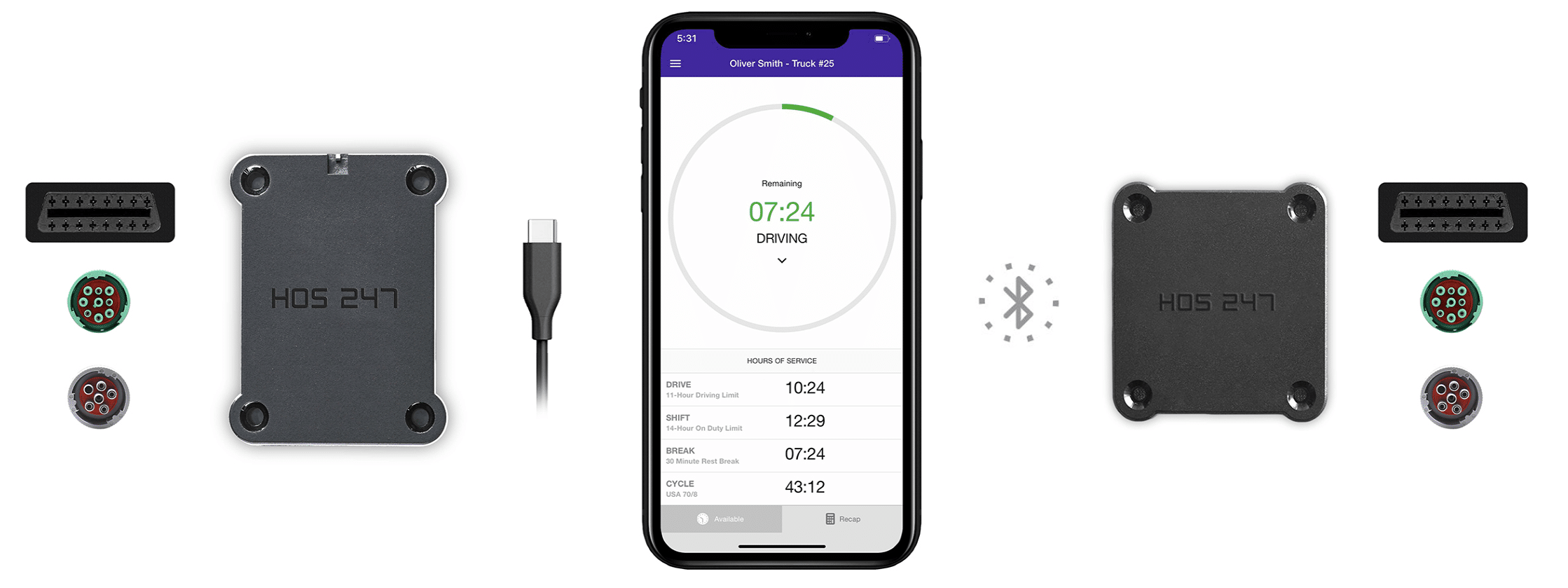Elog Mandate Exemptions in Canada – Who Qualifies and Why a Better ELD Still Matters
Navigating the maze of Transport Canada regulations can feel like driving through thick fog with a bad set of headlights. For truckers, one of the most persistent areas of confusion is the Electronic Logging Device (ELD) mandate and its exemptions. You’ve likely heard conflicting advice at truck stops or read confusing information online. Do you really need an ELD for your older rig? What qualifies as a “short-haul” operation? Relying on guesswork can lead to costly fines, frustrating roadside inspections, and even out-of-service orders.
This guide is designed to cut through the noise. We’re here to provide clear, straightforward answers for owner-operators and fleet managers who are either buying their first ELD or looking to switch from a provider that isn’t meeting their needs. We will demystify the major ELD mandate exemptions under Canadian federal law, explain the specific documentation you need to carry, and discuss how to stay compliant without the headache. By the end of this article, you’ll have the confidence to know exactly where you stand and make the best decision for your operation.
Understanding the ELD Mandate Basics
Before diving into the exceptions, it’s crucial to have a solid grasp of the rule itself. The Canadian ELD mandate, which took effect in June 2021 under the Commercial Vehicle Drivers Hours of Service Regulations, requires most federally regulated commercial motor vehicle (CMV) drivers who must maintain a Record of Duty Status (RODS) to use an approved Electronic Logging Device.
What is an ELD?
An electronic logging device, or ELD, is a piece of hardware that connects directly to a vehicle’s engine control module. It automatically records driving time, engine hours, vehicle movement, distance driven, and location information. In simple terms, it’s a digital, automated version of the traditional paper logbook, designed to be more accurate and harder to manipulate.
Why Does the Mandate Exist?
The primary goal of Canada’s ELD mandate, according to Transport Canada, is to improve road safety by ensuring more accurate compliance with Hours of Service (HOS) regulations. By reducing the risk of driver fatigue — a leading cause of accidents in the trucking industry — the rule helps create a safer environment for all road users and makes roadside inspections more efficient and consistent nationwide.
Basic Compliance Requirements
The default rule is straightforward: if you operate a federally regulated CMV and are required to maintain a Record of Duty Status, you must use an ELD approved by Transport Canada and listed on the official list of certified devices. The device automatically tracks your duty status and ensures you don’t exceed the legal driving limits. However, the rule isn’t absolute. Transport Canada recognizes several exemptions where an ELD is not required. Understanding these exemptions is the key to maintaining compliance without unnecessary costs or equipment — and that’s exactly what we’ll explore next.
Do you have any questions? Talk to ELD Advisor: 650-405-3372 or Request Callback
The 5 Major Elog Exemptions Explained
While the ELD mandate is the general rule, it’s not a one-size-fits-all regulation. Transport Canada has carved out specific exemptions for certain vehicles, drivers, and operational types. Understanding these is the first step to ensuring you’re compliant without spending money on a device you may not legally need.
Here’s a detailed breakdown of the six primary federal ELD exemptions recognized in Canada.
1. The Pre-2000 Vehicle Exemption
This exemption is one of the most common, but it is also the most frequently confused with the U.S. rule. In Canada, the exemption is determined by the vehicle’s model year, not the engine’s.
The rule. Drivers of commercial motor vehicles that were manufactured before the model year 2000 (i.e., vehicle model year 1999 or older) are not required to use an ELD.
Documentation. Your primary proof is the vehicle’s registration (the ownership document), which indicates the vehicle’s model year. You must keep a clear copy of this registration in the cab for inspection.
Common misconception. This exemption is not based on the engine’s model year. A 2005 truck with a 1998 engine is not exempt in Canada (though it would be in the U.S.). The rule is tied directly to the vehicle’s model year as shown on the registration.
2. The Short-Haul Exemption
This exemption is for drivers who consistently operate within a limited geographic area. It’s often used by local delivery, construction, and utility service operators.
The rule. Drivers who operate within a 160-kilometre radius of their home terminal are exempt from using an ELD, provided they meet other short-haul conditions under Canada’s Hours of Service rules.
Shift limits. To qualify, you must return to your home terminal each day and have at least 8 consecutive hours off duty between shifts. The total on-duty time for the day cannot exceed 14 hours.
Documentation. Instead of a logbook, you must maintain accurate time records. Your motor carrier must record your start time, finish time, and total hours worked each day, and retain these records for at least six months.
Breaking the exemption. If you exceed the 160-kilometre radius or fail to return to your home terminal, the exemption is broken for that day. You must complete paper RODS for that day. You can return to the short-haul exemption (no log) the very next day if you qualify again.
3. The Special Permit and Statutory Exemption
In Canada, motor carriers may operate under a specific exemption or special permit issued by a federal, provincial, or territorial authority.
The rule. If a carrier or driver operates under a statutory exemption (for example, under an emergency declaration or a Transport Canada-approved special permit), they may be exempt from ELD use for the duration and scope of that exemption.
Examples. Emergency relief operations (e.g., natural disasters), vehicle testing operations, or operations granted an exemption under section 16 of the federal Hours of Service Regulations.
Documentation. Drivers must carry a copy of the permit or exemption documentation in the vehicle and present it to an inspector upon request.
4. Driveaway-Towaway Operations
This exemption applies to businesses engaged in delivering vehicles as the commodity being transported.
The rule. An ELD is not required if the vehicle being driven is part of a driveaway-towaway operation, such as delivering a new truck, motorhome, or trailer as cargo.
Documentation. You must carry a bill of lading or delivery contract clearly showing that the vehicle itself is the commodity being shipped. For these operations, standard paper RODS must still be used if applicable.
5. Rental Vehicle Exemption
This provides flexibility for temporary or replacement vehicles.
The rule. Drivers operating a commercial motor vehicle rented for 30 days or less are exempt from using an ELD.
Documentation. You must have a copy of the rental agreement in your possession. The agreement must clearly show the start date and duration of the rental. The exemption applies only to short-term rentals; if the rental extends beyond 30 days, a compliant ELD must be used.
How to Document Your Exemption Status
Claiming an exemption isn’t just about meeting the criteria; it’s about being able to prove it during a roadside inspection. The burden of proof is always on the driver. An officer won’t just take your word for it — you must have the correct documentation organized and ready to present. Failure to do so can result in the same fines as not having an ELD at all.
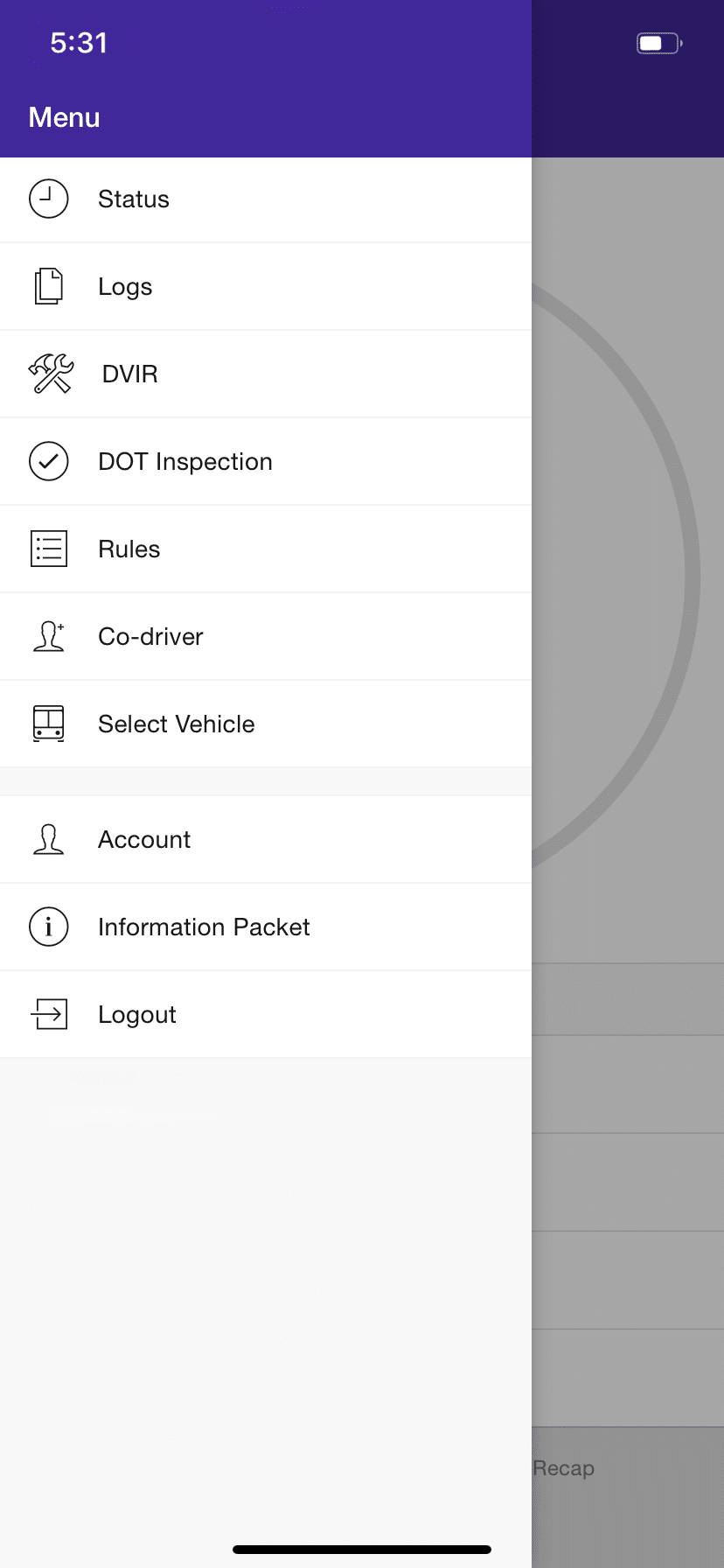
Required Paperwork for Each Exemption
Having the right documents is non-negotiable. Here’s a quick-reference list of what you need to have in your cab for each exemption:
- Pre-2000 vehicle. Your official vehicle registration (ownership) that clearly shows the vehicle model year is 1999 or older.
- Short-haul. While you don’t carry the daily time records with you, you must be able to explain your exemption clearly, and your motor carrier must be able to produce your time records upon request by enforcement officials.
- Special permit or statutory exemption. A valid copy of the special permit or exemption issued by Transport Canada or a provincial/territorial authority, including the name of the carrier, the conditions of the exemption, and the effective dates.
- Driveaway-towaway. The bill of lading, delivery contract, or similar documentation clearly showing that the vehicle being driven is the commodity being transported.
- Rental vehicle. A legible copy of the rental agreement showing the start date and that the rental period does not exceed 30 days.
Best Practices for Roadside Inspections
- Be prepared. Keep your documents in a dedicated, easy-to-access binder or folder. Fumbling through a messy glove box creates a bad first impression.
- Be clear and concise. When an officer asks for your logs, state clearly and politely which exemption you are operating under and be prepared to hand them the relevant documentation.
- Digital vs. paper. While digital copies (like PDFs on a tablet or phone) are often acceptable, technology can fail. It’s always wise to have a paper backup of your critical documents.
The most common documentation mistake is simply not having the proof in the vehicle. Always double-check that your registration, permit, or rental agreement is in the cab before you start your trip.
Provincial and Cross-Border Considerations
While the ELD mandate and its exemptions are established at the federal level under Transport Canada, day-to-day enforcement happens through provincial and territorial agencies. It’s a mistake to assume that every jurisdiction enforces the rules identically. For drivers operating across provinces or into the United States, an extra layer of diligence is required.
- Variations in enforcement. Provinces and territories are responsible for roadside enforcement of the federal Hours of Service rules. While the regulations are uniform nationally, the enforcement approach and inspection priorities may vary slightly from one jurisdiction to another. Keeping your exemption documentation well organized is your best defense against interpretation differences.
- Provincial special exemptions. Certain provinces may issue their own limited exemptions or variances under the federal framework — for example, for specific industries such as oilfield services or seasonal operations. Always verify any regional exemptions that apply to your fleet’s operations.
- Cross-border operations. U.S. exemptions do not automatically apply in Canada, and vice versa. Carriers operating across the border must comply with the rules of the jurisdiction they are currently in.
- Entering Canada. U.S. drivers must comply with Canada’s ELD requirements unless operating under a valid Canadian exemption (such as pre-2000 engines or rental vehicles under 30 days).
- Entering the United States. Canadian drivers must switch to a device registered with the FMCSA to remain compliant with U.S. federal rules.
If your operation involves cross-border transport, ensure your ELD provider’s system is certified for both countries and that your logs remain compliant on either side of the border.

The Hidden Costs of Relying on Exemptions
Operating under an exemption might seem like a straightforward way to save on the upfront cost of an ELD subscription. However, for many Canadian carriers, owner-operators, and small fleets, relying on paper logs and manual processes comes with significant hidden costs that affect your time, your money, and your ability to grow. Before you decide to forego an ELD, consider the real price of sticking with the old way of doing things.
- The administrative burden. Paper logs are time-consuming. The minutes you spend every day filling out grids, calculating available hours, and keeping records add up quickly. That’s time that could be spent driving, maintaining your vehicle, or finding your next profitable load. You’re also legally required to retain months’ worth of these logs for inspection purposes, creating ongoing paperwork that must be meticulously organized and stored.
- The high risk of errors and violations. Paper logs are prone to human error. A simple miscalculation or missing signature can trigger a form-and-manner violation during an inspection. These violations can result in fines, audit headaches, and even affect your carrier safety profile under federal or provincial enforcement systems.
- Lost operational insights. A paper log shows you hours — nothing more. A modern ELD, on the other hand, gives you a complete picture of your operation. Without one, you lose access to critical data that can help lower costs and increase productivity: route optimization, idle-time tracking, preventative maintenance alerts, and accurate fuel and mileage records for IFTA reporting.
- Challenges to scalability. For a single owner-operator, paper logs may be manageable. But as your business grows, the burden multiplies. Tracking compliance across multiple drivers, vehicles, and exemptions quickly becomes inefficient and error-prone, making it difficult to expand operations or maintain consistent oversight.
In the long run, what seems like a cost-saving decision often turns into a business liability. Which raises an important question: even if you qualify for an exemption, is relying on one truly the smartest move for your company’s future?

When to Consider ELDs Despite Elog Mandate Exemptions
The decision to use an ELD isn’t just about compliance — it’s about building a more efficient, profitable, and future-ready business. For many exempt carriers and drivers, the advantages of adopting electronic logs far outweigh the temporary convenience of paper-based tracking.
- Operational efficiency. ELDs automate your Hours of Service tracking, freeing up valuable time each day. Beyond compliance, they deliver real operational benefits: GPS-based route optimization, idle-time monitoring to reduce fuel costs, and accurate mileage reports that simplify IFTA filing and fleet management. In short, a good ELD system becomes a business tool, not just a regulatory checkbox.
- Fewer logbook violations. Manual logs are a leading cause of HOS violations. ELDs virtually eliminate common form-and-manner errors, miscalculations, and missing entries. Maintaining clean, consistent records improves your compliance profile and minimizes roadside inspection issues.
- Future-proofing your operation. Regulations evolve. Exemptions that apply today can change tomorrow, and many brokers, shippers, and fleet partners already require ELD use for all carriers, even when not mandated by law. Equipping your trucks now ensures you stay ready for both future rule changes and new business opportunities.
- Mixed-fleet consistency. If only part of your fleet qualifies for exemptions, maintaining two different systems for HOS tracking creates confusion and inconsistency. Standardizing on one reliable ELD solution simplifies driver training, back-office monitoring, and compliance management across your entire operation.
In the end, voluntarily adopting an ELD is an investment in stability and growth — protecting your business from risk while unlocking efficiencies that paper logs can never match.

HOS247 ELD: The Reliable Choice for Truckers
Choosing to upgrade from paper logs is a big step, and picking the right ELD partner is critical. You need a solution that is reliable, easy to use, and backed by a team that understands the realities of life on the road. HOS247 is designed for truckers who value dependability and straightforward service without the usual headaches.
We’ve built our reputation on providing a top-rated service that puts drivers first. Here’s what makes HOS247 the preferred choice:
- Top-rated multilingual support. When you need help, you need it immediately. Our expert support team is available any day of the week, speaking English, French, Spanish, Polish, and Russian. You’ll talk to a real person who understands your issue and helps you resolve it quickly so you can stay on the road.
- Flexible no-contract policy. We believe in earning your business every month. Unlike providers that lock you into restrictive long-term contracts, HOS247 offers a flexible, no-strings-attached policy. You can scale your plan up or down as your business evolves.
- Durable hardware with warranty. Our ELD hardware is built to withstand Canada’s demanding road and weather conditions and installs in minutes. Every unit is backed by a hassle-free one-year hardware warranty — if it fails, we replace it.
- More than just compliance. The HOS247 platform goes beyond basic logkeeping. It offers real-time GPS fleet tracking, idle time monitoring, vehicle diagnostics with fault-code alerts, and automated IFTA mileage calculations — simplifying every aspect of your operation.
- Transparent and fair pricing. We provide clear, upfront pricing with no hidden fees. You get a premium ELD solution at an honest price.
- Easy transition and risk-free trial. Our intuitive, driver-friendly app makes switching from paper logs effortless. And with our two-week, risk-free trial, you can test HOS247 for yourself. If it’s not the right fit, return it for a full refund — no questions asked.
HOS247 is more than a compliance tool; it’s a complete support system for your business. We deliver dependable technology and responsive customer service so you can focus on what you do best: driving.
Conclusion
Navigating Canada’s ELD mandate and its exemptions requires a clear understanding of the rules — from the pre-2000 engine exception to the radius and time limits for short-haul and special-operation drivers. As we’ve discussed, knowing whether you qualify is only half the job. Maintaining accurate, verifiable documentation is equally essential to protect yourself from costly fines and violations during inspections.
While exemptions provide flexibility, the most forward-thinking carriers and owner-operators see ELDs as an investment, not an expense. Beyond compliance, they offer efficiency, accuracy, and valuable insight into fleet performance. Adopting reliable electronic logging technology helps you safeguard your safety rating, save time, and position your business for long-term success.
Don’t let outdated paper logs limit your potential. Take control of your compliance and efficiency today. Ready to see the difference a top-rated ELD can make? Start your two-week, hassle-free trial with HOS247 and discover why thousands of drivers trust us to keep them compliant and on the road.
A Note to Our Readers on Compliance
This article is intended for informational and educational purposes only. It is not a substitute for official regulatory guidance or legal advice. HOS and ELD regulations are complex and subject to change and interpretation by enforcement officials. Please always refer to official sources for the most current and accurate information.

As an expert in B2B and B2C sales, I’ve dedicated myself to perfecting sales processes and client retention strategies in the logistics and trucking industry. I have significantly contributed to the expansion of the ELD service, catering to retail and wholesale clients in need of HOS247 ELD solutions. My unwavering commitment to implementing state-of-the-art sales techniques and technologies ensures the continuous growth and success of businesses I work with.











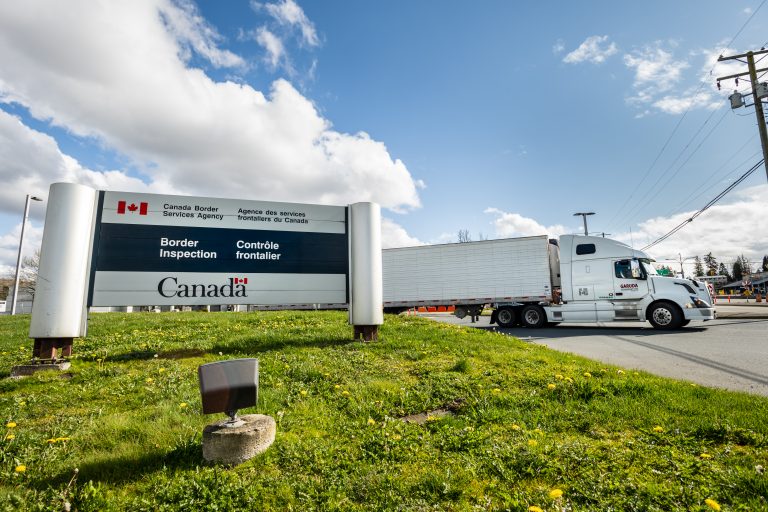
For truckers and trucking companies operating in Canada, the rules on how hours of service are to be collected and logged are changing. Beginning January 1, 2023, all commercial drivers in Canada must comply with the rules mandating the use
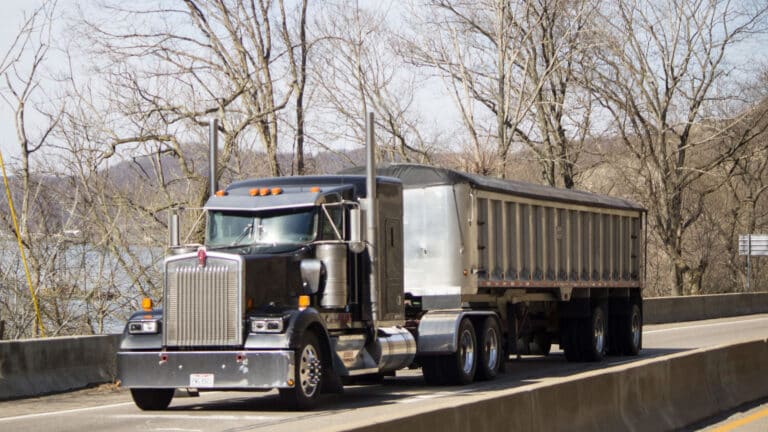
The advantages of using GPS trackers are significant, including enhanced safety, reduced fuel costs, increased productivity, and better communication, all of which translate into lower operational costs. By enabling fleet managers to monitor and manage vehicles and assets in real-time,
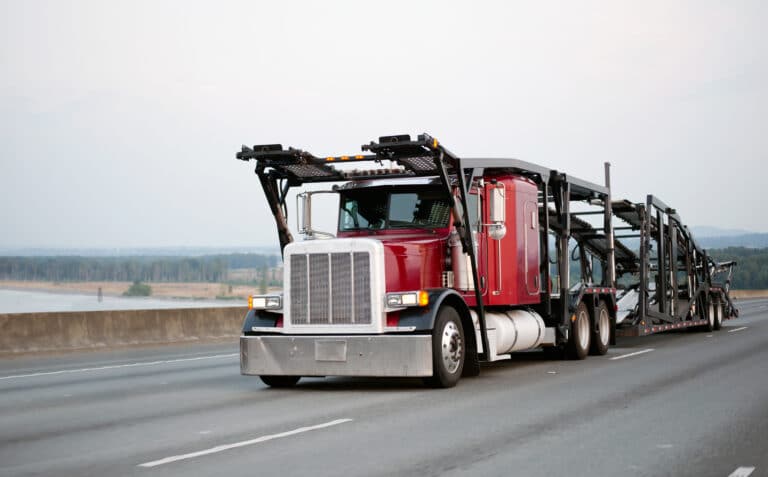
For truck owners and carrier companies in Canada, logistics is always a priority. This is where real-time tracking of commercial vehicles can offer multiple benefits, including increased productivity and enhanced security. Before going into the advantage of live truck tracking
